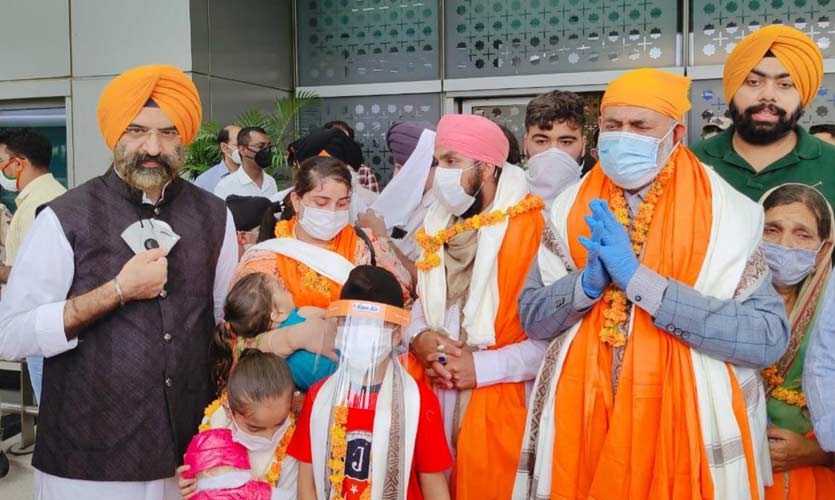One of the defining attributes of a great nation is its treatment towards its weakest inhabitants. The spirit of a regional power is often displayed by its tolerance towards refuging the displaced from its neighbouring countries, at least during major crises.
In one of the finest gestures towards maintaining international relations, the Indian government recently gave the nod for sheltering the minority Afghan Hindus and Sikhs after Kabul’s fall to the Taliban. Prime Minister Narendra Modi, on August 17, 2021, noted, “India must not only protect our citizens, but we must also provide refuge to those Sikh and Hindu minorities who want to come to India, and we must also provide all possible help to our Afghan brothers and sisters who are looking towards India for assistance.”
On August 22, 2021, India airlifted 392 people from Afghanistan. Three aircrafts were used for the operation, including one heavy lift C-17 military transport aircraft of the Indian Air Force. The military airplane evacuated 168 people – 107 Indian nationals stranded in the foreign nation and 23 Afghan Sikhs and Hindus – from Kabul to the Hindon airbase in Uttar Pradesh. Others were evacuated through Air India and Indigo aircrafts, which operated through Tajikistan and Qatar. Among those evacuated were also Afghan lawmakers Anarkali Honaryar and Narender Singh Khalsa and their families, who are now considering India as their second home.
Reportedly, the massive evacuation is facilitated by a small multi-agency Indian team, which is now based at the US-controlled Kabul airport. The team took charge soon after India evacuated its representatives from the embassy in Kabul and comprises Indian diplomats from several sections of the government.
The evacuation process will continue in the coming days and the Indian government has asserted that it will provide shelter to all non-Indian Hindus and Sikhs who seek refuge in the country. However, a similar sentiment of compassion has not been displayed for the Rohingya Muslims seeking refuge in India, during the continuing Myanmar crisis. Over seven million Rohingya Muslims, which is a minority ethnic group in Myanmar, escaped from their homeland and fled to neighbouring countries like Bangladesh and India during one of history’s deadliest genocide in 2017. As described by the United Nations (UN), it was “a textbook example of ethnic cleansing”.
While most neighbours of Myanmar provided shelter to the Rohingya Muslim refugees, with Bangladesh taking in over one million people, India turned a rather cold shoulder towards them. The Indian government, in 2017, termed the violent conflict between the Buddhists and Rohingyas as Myanmar’s “internal affair”, and politely distanced itself. This led to questions being raised on the country’s approach towards refugees.
India termed the Rohingya Muslims as “illegal migrants” and had also planned to deport them back to Myanmar despite the ongoing violence. The UN has earlier strongly noted that deporting refugees violates the principle of refoulement. However, as India is not a signatory of the UN Refugee Convention, it refuses to comply. Noteworthy, the Indian government has termed the Rohingya refugees in Bangladesh as “displaced people” and agreed to Bangladesh’s request to aid for the time being.
Several Rohingya Muslims have been arrested by the Indian authorities in the past months. On July 25, nine Rohingya refugees, including three women and a child, were arrested in Assam’s Guwahati for allegedly carrying fake United Nations High Commissioner for Refugees (UNHCR) ID cards. In a separate incident, 15 Rohingyas, including six children and three women, were arrested by the Government Railway Police while attempting to board the Silchar-Agartala train. According to the police, the refugees are treated as illegal entrants due to lack of proper documents. Moreover, earlier last month, home minister Amit Shah informed the Parliament that foreign nationals, including Rohingya Muslims, entering India illegally or without proper documents will be considered as “threats to the national security”.
Read more: Why Have Russia, China And Iran Decided To Let It Play Out With The Taliban?
In 2019, UN human rights experts criticised India’s stand to refuse shelter to the Rohingyas during the crisis in Myanmar. Experts have also condemned the Indian government’s decision to forcefully return the Rohingyas to their country where they are at risk of being attacked because of their ethnicity. In an article published by the UN India, a human rights expert was quoted saying, “We also remain concerned with the systemic use of indefinite detention of Rohingya in India, which is indicative of the unacceptable conditions of discrimination and intolerance they face in the country where they have sought refuge.”
While the Indian government’s decision to provide refuge to the Afghan Hindus and Sikhs during the Afghanistan crisis has been lauded by many as a humanitarian gesture, its approach towards the Rohingyas amidst the Myanmar crisis still raises questions on the country’s policy towards refugees. It can be noted that India’s pursuit to be the regional power can be facilitated by making its approach towards refugees more impartial and inclusive.










